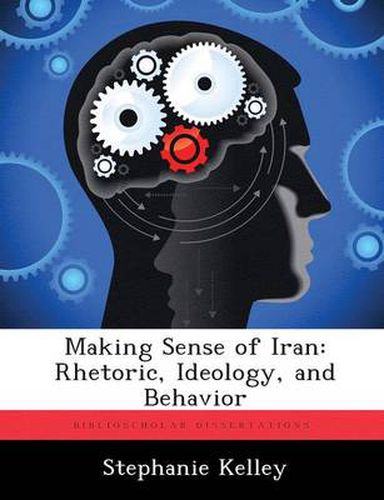Readings Newsletter
Become a Readings Member to make your shopping experience even easier.
Sign in or sign up for free!
You’re not far away from qualifying for FREE standard shipping within Australia
You’ve qualified for FREE standard shipping within Australia
The cart is loading…






This title is printed to order. This book may have been self-published. If so, we cannot guarantee the quality of the content. In the main most books will have gone through the editing process however some may not. We therefore suggest that you be aware of this before ordering this book. If in doubt check either the author or publisher’s details as we are unable to accept any returns unless they are faulty. Please contact us if you have any questions.
For the last three decades, the US has viewed the Islamic Republic of Iran as a significant threat to its national security interests based in large part on its inflammatory ideological rhetoric. This thesis compares the Iranian regime’s radical statements with its actual foreign policy to determine if their external behavior is consistent with their rhetoric. It specifically examines Iran’s foreign economic policies to determine whether Iran’s ideological beliefs or its material interests guide its actions. In order to assess the potential ideological basis of Iran’s foreign policies, the author reviews the historical context that led to the Iranian Revolution and the resulting ideology of Khomeinism. Included in this discussion are insights into why the US-Iranian relationship is characterized by such intense mistrust and hostility, which has interfered with the objective analysis of threats and left policymakers on both sides fixated on each other’s rhetoric. Then, the rhetoric and behavior of three distinct Iranian administrations are examined to determine consistencies and variances: President Akbar Hashemi Rafsanjani (1989-97), President Mohammad Khatami (1997-2005), and President Mahmoud Ahmadinejad (2005-present). The final section compares rhetoric and ideology across administrations and demonstrates that while ideological rhetoric changed from president to president, behavior did not. All three pursued pragmatic, interest-driven policies designed to bolster Iran’s economic and security interests. In sum, this thesis advocates a more sophisticated appreciation of the Islamic Republic’s worldview and interests in order to aid US policy makers in devising strategies that are more likely to serve American security interests.
$9.00 standard shipping within Australia
FREE standard shipping within Australia for orders over $100.00
Express & International shipping calculated at checkout
This title is printed to order. This book may have been self-published. If so, we cannot guarantee the quality of the content. In the main most books will have gone through the editing process however some may not. We therefore suggest that you be aware of this before ordering this book. If in doubt check either the author or publisher’s details as we are unable to accept any returns unless they are faulty. Please contact us if you have any questions.
For the last three decades, the US has viewed the Islamic Republic of Iran as a significant threat to its national security interests based in large part on its inflammatory ideological rhetoric. This thesis compares the Iranian regime’s radical statements with its actual foreign policy to determine if their external behavior is consistent with their rhetoric. It specifically examines Iran’s foreign economic policies to determine whether Iran’s ideological beliefs or its material interests guide its actions. In order to assess the potential ideological basis of Iran’s foreign policies, the author reviews the historical context that led to the Iranian Revolution and the resulting ideology of Khomeinism. Included in this discussion are insights into why the US-Iranian relationship is characterized by such intense mistrust and hostility, which has interfered with the objective analysis of threats and left policymakers on both sides fixated on each other’s rhetoric. Then, the rhetoric and behavior of three distinct Iranian administrations are examined to determine consistencies and variances: President Akbar Hashemi Rafsanjani (1989-97), President Mohammad Khatami (1997-2005), and President Mahmoud Ahmadinejad (2005-present). The final section compares rhetoric and ideology across administrations and demonstrates that while ideological rhetoric changed from president to president, behavior did not. All three pursued pragmatic, interest-driven policies designed to bolster Iran’s economic and security interests. In sum, this thesis advocates a more sophisticated appreciation of the Islamic Republic’s worldview and interests in order to aid US policy makers in devising strategies that are more likely to serve American security interests.